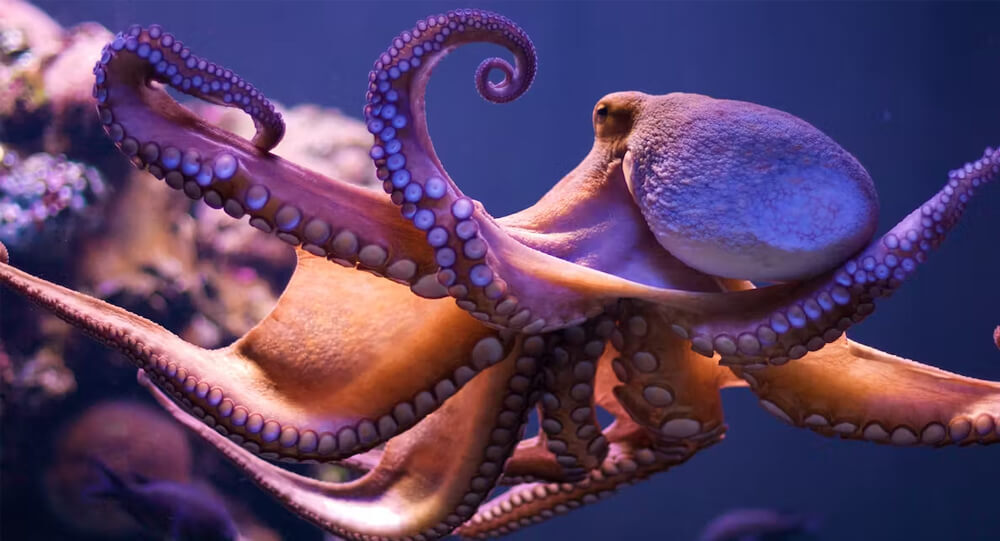
Aristotle stated in his book History of Animals more than 2,000 years ago that the octopus is a stupid creature because it will approach a man’s hand if it is lowered into the water. But in more recent years, octopuses’ curious nature has helped scientists learn about their intelligence.
Essays like Sy Montgomery’s “Deep Intellect” and movies like the Oscar-winning documentary My Octopus Teacher portray octopuses as inquisitive, sensitive, and even playful animals.
Is an Octopus Intelligent?
Researchers are discovering astonishing parallels to our own minds, along with bizarre differences in how our species experiences the world, as they continue to study the genetics, brains, and sensory abilities of octopuses.
Clams and snails are both members of the phylum of mollusks, which includes octopuses. Evolutionarily speaking, we diverged from one another about 600 million years ago; a flatworm is our most recent common ancestor. Despite this evolutionary gap, there are fundamental similarities between our brains.
Octopuses: How Intelligent Are They?
Octopuses employ that intelligence in a number of different ways. The Internet has a soft spot for tales of octopuses sneaking back home after escaping their tanks, squelching across the room, and munching on other aquarium inhabitants.
Additionally, according to Wen-Sung Chung, a researcher at the University of Queensland who specializes in cephalopod neurobiology, their hunting behaviors in the wild exhibit “highly complex, calculated behaviors.”
“They can do foraging navigation based on the landmarks or the polarization patterns of the sky,” he claims, and they also engage in “interspecific cooperation hunting: fish and octopus, they can hunt together. There are very few animals like that.
In addition to all of that, says Mather, octopuses engage in play, a behavior usually reserved for highly intelligent creatures like wolves, dolphins, and people.
Human and Octopus Brains
The central processing areas in the brains of both humans and octopuses are responsible for making decisions and gathering and integrating data from various sources, such as our sensory organs.
Our two-lobed, bilaterally symmetrical brains are housed inside of our skulls. Despite all these similarities, however, there are some unexpected differences in our nervous systems. The most striking one may have something to do with the arms, which are an octopus’ most distinctive feature.
Decision-Making Arms
Tentacles are covered in suckers, but octopus arms literally have a mind of their own. Three-fifths of an octopus’s neurons, or nerve cells, are in its arms; each sucker has a unique group of neurons that regulate it. As a result, each arm has a great deal of autonomy when it comes to moving, detecting its environment, and even making simple decisions.
“If I chopped off your arm, it would lie on the floor,” asserts Jennifer Mather, a psychology professor at the University of Lethbridge and a scientific consultant for My Octopus Teacher. “If I cut off an octopus’s arm, for a while it behaves like a sort of independent entity.”
Overall, the octopus brain is “less of a control system than our brain,” according to Mather, due to its dispersed network of neurons and autonomous parts. However, Mather also points out that humans have neurons in other parts of our bodies, such as our guts and the long nerve cells that run along our limbs to our extremities. Simply put, octopuses take that idea too far. But according to Mather, it is untrue that octopuses have a brain in each of their arms.
Sensing the World Through Octopus Eyes
Octopus eyes have lenses similar to ours for sensory processing, but they are color blind. Scientists are further perplexed by the fact that octopuses have psychedelic color-changing abilities that they employ for communication and concealment. Instead, polarization—the various directions in which light waves vibrate—can be detected by octopuses.
Given that polarization is less affected by deep water, which tends to filter out colored light, particularly at the reddish end of the spectrum, this may be a more useful sensory tool for octopuses. Octopuses have a variety of ways to process visual information, but they also have impressive chemical sensitivity.
Octopuses also display a ton of behaviors that, when combined with their organization and sensory processing abilities, make them appear extremely intelligent to researchers (as well as non-scientists). According to neuroscientist Anil Seth of the University of Sussex, octopuses can help us understand an intelligence that is very dissimilar from our own.
He claims that considering the inner world of a common octopus can help us comprehend the type of consciousness that, if any sentient aliens exist, they may possess.
Inside an Octopus’s Brain
One recent study found that octopus brains contain an unusually high amount of non-coding microRNA molecules used in regulating genes and constructing proteins. Scientists are still learning new mechanisms that explain how octopuses are capable of such cognitive sophistication.
But Mather has a theory regarding the evolutionary pressures that led to intelligent octopuses. She recalls watching Jacques Cousteau’s underwater documentaries as a child to see sea life, such as octopuses.
He referred to them as “the soft intelligence,” and that actually touches on a crucial aspect of the octopus, she claims. “They lack all of these physical defenses, such as an exoskeleton, spines, and unpleasant tastes. In essence, their means of survival are their cunning.

A man travels for hours daily through a drought to provide water for wild animals.
This man travels throughout Kenya bringing thirsty animals thousands of litres of water. Patrick Kilonzo Mwalua regularly travels to the Tsavo, where extreme drought is endangering the lives of elephants, buffalo, zebras, and antelope. He promises to keep giving out water every week until it starts to rain in the hopes that getting the word out will lead to a long-term fix.

A Super Cat With Excessively Large Muscles Goes Viral Due To A Rare Condition
The cat suffers from Myostatin-related muscular hypertrophy, which leads it to grow muscle mass while not desiring to.

How European Rabbits Took over Australia
In 1859, wealthy settler Thomas Austin released 13 wild rabbits on his Australian estate. By 1920, their population grew to 10 billion.

Why Crows Hold Funerals for Their Dead
Crows are far more than noisy backyard birds; they engage in peculiar, ritualistic behaviors when one of their own dies. Known as “crow funerals,” these gatherings involve groups of crows circling, calling, and sometimes even interacting physically with the deceased in ways that stump scientists and captivate bird watchers. What drives this strange behavior? New research reveals it’s a complex mix of learning, social bonding, and survival instinct wrapped in an enigmatic ritual.

Photos of dogs who were stung by bees yet remained adorable
Flies are sky raisins, aren't bees jalapeno sky raisins as well? Please note: you are a terrible person if you laugh at this gallery, just kidding. Enjoy the photos of dogs who were stung by bees yet remained adorable.

Bear, Tiger, And Lion Became Friends For Life
In 2001, a Bear, Tiger, And Lion cub where found abandoned in a drug dealer's basement. They were soon adopted by a sanctuary and lived together ever since.

Earthquakes: Can Animals Really Predict Them?
In 1975, when officials in the Chinese city of Haicheng were alarmed by odd and anxious behaviors of dogs and other animals. These observations led them to order 90,000 residents to evacuate the city. Only a few hours later a 7.3 magnitude earthquake destroyed nearly 90% of the city’s buildings.

The Evolution of Flight: From Dinosaurs to Birds – A Journey Through Time and Science
Flight is one of nature’s most remarkable adaptations, but its origins trace back millions of years before modern birds took to the skies. Emerging from theropod dinosaurs during the Jurassic period, birds evolved feathers, wings, and lightweight bodies that enabled powered flight. This detailed narrative explores the fascinating evolutionary path from ground-dwelling dinosaurs to the aerial masters of today, blending science, intriguing fossil finds, and surprising trivia about our feathered ancestors.

10 Rarest and Albino animals you haven’t seen
For centuries, people have been fascinated and enchanted by the ghostly appearances of abnormally white animals. People have loved albinos and other unusually white animals so much that they may be helping to increase their numbers, despite the difficulties these animals face in the wild. While these unusual animals did not win the genetic lottery, they have persevered in the face of adversity.

Jack the Baboon operated a railroad, earned a living, and never made a mistake
A baboon worked as a signalman for the railroad in the late 1800s. He never made a mistake and worked for the railroad until the day he died.

Remembering Alex: The African Grey Parrots Final Message
"You be good, I love you. See you tomorrow" Parrot's last words to her caretaker. Alex (1976 – September 6, 2007) was an African Grey Parrot and the subject of a thirty-year (1977–2007) experiment by animal psychologist Irene Pepperberg, initially at the University of Arizona and later at Harvard University and Brandeis University. Pepperberg bought Alex in a regular pet shop when he was about one year old.

Kipekee, the world's only spotless giraffe, was born at Brights Zoo
The world's only spotless giraffe was born at a zoo in the United States. The giraffe born without spots on July 31 is the only one of her kind on Earth.

The unique friendship of a bear and a dog
A female grey wolf and a male brown bear's remarkable "friendship" was captured by Finnish photographer Lassi Rautiainen over the course of ten days in 2013. Together, they traveled everywhere while hunting and splitting their catch.

9-Year-Old Hero from Yemen Rescues Fox from a 3-4 Floor Deep Well—No Ropes, Just Bravery
In an inspiring act of courage, a 9-year-old boy from Yemen rescued a trapped fox from a deep well—three to four floors underground—without any climbing equipment. Discover the full story of how quick thinking, determination, and sheer bravery saved an innocent life against all odds.

Chen Ami, The Bravery pigeon that saved 194 Soldier
During World War 1, a carrier Pigeon name Cher Ami was shot, blinded and had her leg blown off. She is still able to deliver the message and saved lives 194 soldiers.

Megamouth Shark And Her Babies Found Dead In The Philippines
Filipino zoologists have recorded a pregnant megamouth shark for the first time ever since the rare aquatic specie was discovered in 1974.

How Switzerland ended rabies epidemic by air-dropped vaccinated chicken heads
A rabies epidemic struck foxes in Switzerland in the 1960s. The government wanted to vaccinate foxes against rabies, but manual vaccination was difficult and expensive. Instead, they began dropping vaccinated chicken heads across the countryside for the foxes to consume, and the rabies vanished.

9 Reasons Crows Are Smarter Than You Think
Crows have the intelligence of a 7-year-old human, making them one of the smartest non-primate animals on the planet. They use tools, have a long-term memory that includes facial recognition, and comprehend analogy.

The story of a man who spent 72 hours with 72 venomous snakes to prove they only bite when provoked
In the 1980s, an Indian man spent 72 hours in a glass cabin with 72 snakes, some of which were extremely venomous. His aim was to prove that snakes only attack when provoked. Remarkably, he was not bitten once in those 72 hours and even set a Guinness World Record in the process.

Blind dog guides by goose, Story of Boxer and Buttons’ friendship
When Baks the blind dog was left blinded after an accident, his friend Buttons became his seeing-eye-goose by hanging on to him with her neck and honking to direct him.

Titanoboa cerrejonensis, fossils of the world’s largest species of snake
In 2009 in a coal mine of Columbia, scientists discovered fossils of the world’s largest species of snake. The species is called “Titanoboa cerrejonensis,“and it is from around 60 million years ago. It would have had measured about 48 feet long and weighed about 2,500 pounds

13-year-old dog missing for two months found alive in a cave.
On Aug 6, 2022, A group of Missouri cave explorers accidentally found and helped rescue a senior dog that had been missing for two months. It is unclear how long the dog was in the cave or how it managed to survive.

Andy Goose - The Goose With No Feet but wears Nike shoes
Andy was a goose who was born without feet. However, his owner came up with a solution to help him stand and move around by outfitting him with Nike sneakers. This gave Andy the ability to move around like any other goose, but it also made him a source of inspiration for disabled children. Sadly, he was mysteriously murdered in 1991.

The Incredible Story of Sergeant Stubby, the Dog Who Became a War Hero
Sergeant Stubby was not just an ordinary dog—he was an extraordinary war hero who served alongside American troops during World War I. From catching a German soldier by his pants to alerting soldiers of mustard gas attacks and locating wounded comrades, Stubby’s bravery saved countless lives in the trenches. This article chronicles the inspiring journey of the stray dog who became the most decorated animal of the Great War and remains a beloved symbol of courage and loyalty.

The story of The chicken that lived for 18 months without a head
Mike the Headless Chicken was a rooster whose head was accidentally chopped off but miraculously survived. This is due to most of the brain stem being left intact. He was fed using a special tube that delivered food directly into his esophagus. Despite his lack of a head, he lived for 18 months, gaining worldwide fame before ultimately choking on a kernel of corn during one of his tours, in a Motel in Fruita, Colorado.


























